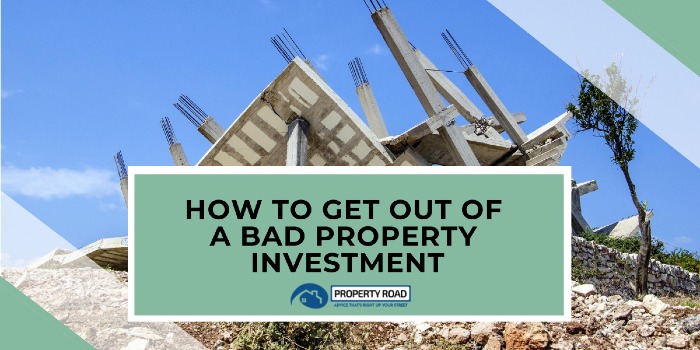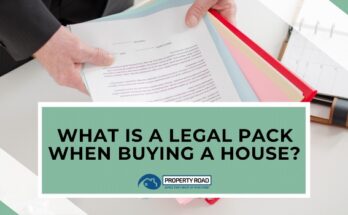While bricks and mortar are popular investment choices, they don’t always succeed – so for anyone asking how to get out of a bad property investment, here are the answers.
What with tax reforms, fast-rising property prices and difficulty accessing finance means there will be landlords wanting to cut their losses and sell their investment property.
For some, they may have made a bad investment when they bought the property because they have not appreciated the costs that come with running a buy to let.
There are also large costs to be stumped up when selling a rental property including estate agency and legal fees, the potential of capital gains tax and the mortgage lender wanting an early repayment fee.
However, there are some things to consider before getting out of a real estate investment and here we take a look at some of the solutions.
Why do you want to sell your property investment?
It’s important to understand why you want to sell your property investment before you do so.
It may be that:
- The property is in the wrong location;
- You struggle to attract tenants;
- You cannot afford the mortgage payments;
- You are fed up with tenant hassle.
There’s no doubt that it’s a more expensive undertaking to run an investment property, for example, there’s no automatic wear and tear relief and higher rate taxpayers receive a tax credit at 20% on their mortgage interest. However, there are expenses that are allowable against tax for an investment property to help reduce its running costs.
Or, you may simply want to sell your property investment because it has risen in price in a strong property market and you want to cash in the profits and look at other investment ventures.
Work out what your investment problem is

Before making the final decision to sell up, it’s worth looking at what your investment problem is.
You should begin to do this when you notice that your investment is going sideways and try to work out why that’s happening.
For a property investment, there is a range of reasons why profitability can be affected including:
- You cannot charge enough rent;
- A recession has hit the market;
- No tenants are wanting to live there;
- A tenant has trashed your property;
- The tenant has racked up rent arrears which has hit cash flow.
All of these are sound reasons for selling up, but you could chalk this investment up as experience.
Wherever you buy an investment property, you should consider this as a long-term undertaking and always ensure that tenants want to live in the property – and that you can charge enough rent.
If your house is in the wrong place, then you’ll struggle to find tenants, for example, offering a family home without being close to schools or local amenities.
Having a tenant trash a property is one of the risks every landlord takes, and sometimes the repair bill can be hefty.
Also, due diligence is crucial and it may be that your tenant referencing process is not strong enough to weed out the poor-quality tenants.
The referencing process may also be the reason why you have a tenant racking up rent arrears and you will need to spend money on legal fees to take possession of your property.
It’s also important to appreciate that it’s very rare for any property investor not to encounter at least one of these problems with a property – and they remain in the sector.
Other problems landlords may encounter with an investment
In addition to the reasons given above, you may also want to sell up because:
- Your property was a poor impulse choice at auction;
- You don’t have the cash for maintenance and other bills;
- You did not have a full survey done in the house and it now needs expensive repairs.
But these aren’t the only issues when it comes to selling an investment property because you need to know whether you are selling up with:
- A sitting tenant in your property;
- A vacant property.
Selling an investment property with a sitting tenant

Having mentioned that the process of selling up is not that straightforward when you have a sitting tenant, it’s worth looking at this issue.
There is, however, one advantage when it comes to selling a property with a sitting tenant, and that is it will be attractive to other real estate investors.
That means they:
- Can invest in a portfolio property;
- Don’t have to spend money finding a tenant;
- Will earn money as soon as they buy your property.
In many ways, that’s a win-win situation for both you as the seller, and a landlord as the potential buyer.
Don’t forget that the selling process can take several months and when you do find a buyer, the conveyancing process can take anything between 8 and 12 weeks.
Also, you cannot upset your tenant and you must follow the rules when selling a tenanted property.
Telling tenants about selling a property
If you want to sell a tenanted property, then you need to talk to the tenant before you do anything.
They must be kept informed at every stage of the process because you will need their cooperation for this to work smoothly.
Also, you will be promoting trust by telling them what your plans are.
It’s also worth giving the tenant an option to buy your investment property – if they have lived there for some time and enjoy it, then there’s the potential of them accepting your offer.
When selling a property with a tenant, you must:
- Give your tenant the reason why you are selling;
- Reassure them that their tenancy will continue;
- Tell them that you are selling the property with them as the sitting tenant.
How to sell a property with a sitting tenant
The easiest and potentially quickest way of selling a property with a sitting tenant is to another landlord.
Not only will they pick up a property with a tenant, but the tenant gets to remain in your property.
However, the landlord will need to be reassured that the sitting tenant is someone to trust.
That means they will take a close look at the tenant and may even undertake their own referencing checks to ensure they are reliable.
They may even look closely at the terms of your tenancy agreement.
This really shouldn’t be a problem if the tenant has been living there for a long time but if the landlord’s referencing checks highlight potential issues, then you may need to reconsider selling your investment home with a sitting tenant.
Don’t forget that a potential landlord buyer will want to see paperwork such as the property inventory, the Right to Rent record in England and the Gas Safety certificate.
Transferring deposits and tenancy agreements

One of the most important aspects when selling up is not to forget that you will need to:
- Transfer your tenant’s deposit to the new landlord;
- Have the new landlord start a new tenancy agreement.
This means you will no longer be responsible for the actions of your tenant, and you need to ensure that you are no longer named as a landlord at the property.
For the tenant, nothing should change and you are simply being a responsible landlord.
The new landlord will also need to put the deposit into a Government-approved protection scheme, though this will be highlighted during the conveyancing process.
The Deposit Service (TDS) offers more information on when an investment property ownership has changed with a sitting tenant.
How to exit a poor property investment
If the investment property is vacant, the quickest way of selling is to use an auction.
There are also house buying companies willing to buy a property quickly – though be aware that you will not realise the market value.
You could also use estate agents – find an agent experienced with dealing with investment properties and it’s likely they will have a database of potential investors and landlords.
The advantages of selling a vacant buy to let property include:
- It will appeal to a greater number of potential buyers;
- You will achieve a higher selling price with an empty property;
- Your home will be chain-free which will appeal to more buyers and sell quicker;
- The conveyancing process should be easier and quicker with an empty property;
- It’s easier to organise viewings because you don’t have to fit in with the tenant’s schedule.
Be aware too that when you have a property without a tenant, there is no rental income and if you’re still paying a mortgage, you need to find a buyer quickly.
You may also find you need to ‘stage’ your property for viewers to make it look tidy and clean, as well as attractive to them as a potential home.
Evicting a sitting tenant from your property
While we have looked at selling a vacant property and selling a property with a sitting tenant, you may decide to evict a tenant so you can sell with vacant possession.
However, unless your tenant has broken their tenancy agreement terms, you can only serve them with a section 21 notice once the fixed term tenancy has ended.
If the tenant does not leave the property by the given day, you can seek a possession order from a court.
Again, you should remain on good terms with the tenant and tell them what your plans are before issuing a section 21 notice.
Be aware that should the tenant decide to fight the eviction, this legal process can take several months to complete.
How to sell an investment property

Whatever your reason is for selling up, you will need to research carefully how to sell an investment property.
That’s because you will be wanting the best possible price and you need to balance how quickly you want to sell up with searching for a potential buyer. It may even be worth considering ways of adding value to the property to push up the price – for example, adding a loft conversion to create an extra bedroom.
Here, we look at the potential routes for selling investment property.
Estate agents
Whether you opt for a high street estate agency or an online offering, these firms have the experience and the database to find buyers quickly.
Sell privately
You can find buyers privately using investor and landlord forums online or networking events. You can even use landlord conferences on Facebook groups and other places where property investors meet.
Landlord-to-landlord service
There are landlord-to-landlord service companies available that will help find a buyer. They can prove useful and will have a database of potential landlords to contact, though that is the extent of their service.
Quick sale company
If you don’t have the time to sell using an estate agent or even using an auction house, then a quick sale company could be for you. These fast-buying services will have the cash to buy your investment property, but you will be selling at less than the market value. However, the compensation is that you will sell quickly.
Property auctions
When it comes to selling property investments, property auctions are great places. You will need to set a reserve price and allow access to the property from potential buyers in the run-up to the auction.
Essentially, when it comes to selling an investment property, you need to make some crucial decisions beforehand about how much you want to sell for, how quickly you want to sell and whether the tenant will remain in the property during this process.
Personal circumstances and selling an investment property
There’s no doubt that for many wannabe property investors, their personal circumstances may change which means holding onto a property becomes a chore.
If you are hanging on hoping that house prices will help cover the initial purchase price plus any refurbishment costs, then selling makes sense.
You may also be looking for financial flexibility to pursue other interests and investment opportunities so you will need to liquidate the cash in your investment property.
It makes sense also to speak with an independent financial adviser, you may have to pay for his or her advice, who can then provide suitable advice for you to achieve your investment needs and goals.
Frequently asked questions about selling investment property
Can I sell my investment property with a sitting tenant?
Yes, you can sell your investment property if it has a sitting tenant, and without the tenant. You potentially boost its appeal to other investors with a sitting tenant, though the number of potential investors is restricted. Not having a tenant means you will attract a wider circle of buyers.
Will I have to pay CGT on an investment property?
If you are selling an investment property because you want to access the equity in it, then you need to appreciate that you may have to pay capital gains tax (CGT). That’s because capital gains tax will be due on any profit, or ‘gain’, of more than £12,300 in the 2021/22 financial year. So, if you pass this threshold in a tax year then you need to pay CGT. As a basic rate taxpayer, this will be 18% of any gain over the threshold, while higher rate taxpayers will pay 28%.




